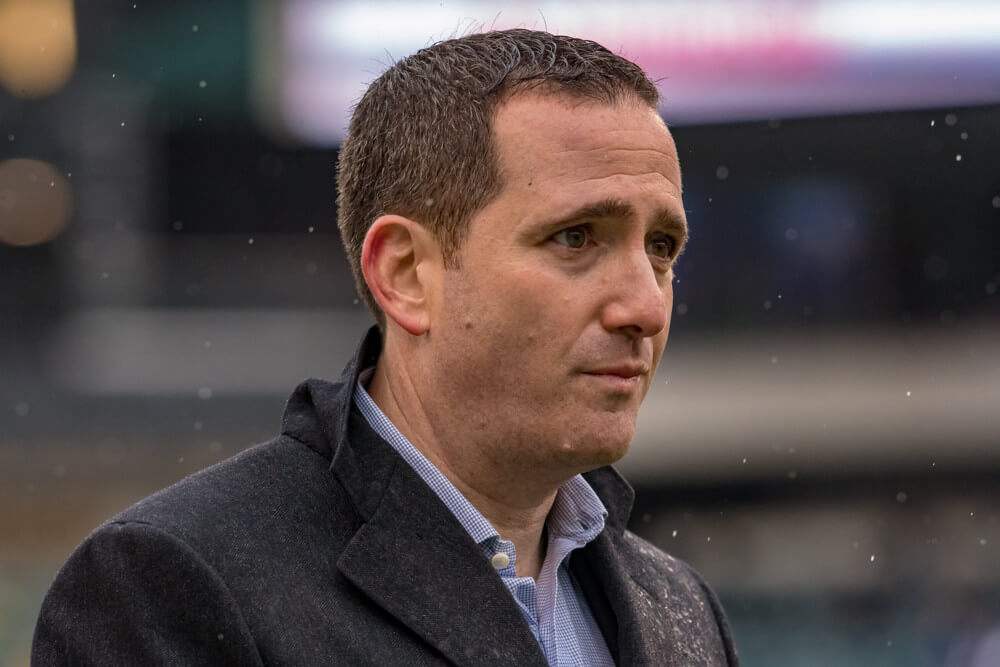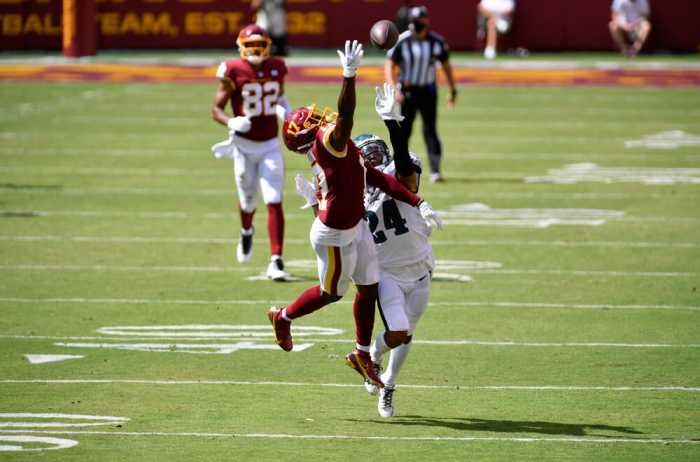It’s been a busy few days for the Philadelphia Eagles. Some big contract restructures have been negotiated in what appeared to be a bid to reduce the $40M debt they have to pay off just to break even this offseason. However, a recent Jason Kelce contract extension highlights the flaw in Howie Roseman’s methods.
There is absolutely nothing wrong with giving Jason Kelce the payday he deserves, especially when it’s one he’s surrendered to benefit the team on numerous occasions. This isn’t a slight at the value Kelce will bring to the Eagles in 2021 or the incredible player/person he is. However, when it comes to Howie Roseman, the concerns are mounting quickly.
For those who pay close attention to the Eagles during the offseason, this move would have come as a surprise. Jason Kelce was already on the books for 2021. He didn’t need a contract restructure based on face value. He would’ve only cost the Eagles $4M in cap space and barring a surprise retirement, it looked like a near certainty that he would play under that price. Upon closer inspection though, it’s easy to see why Roseman scrambled to a new deal.
Howie Roseman’s method to beat the salary cap restraints has long-resembled a credit card. Roseman would ‘borrow’ money by using loopholes to push the big bucks into ‘dummy years’. When the time came to pay that player, he’d ask others to do the same, essentially paying a credit card off by using another credit card. Over time, all of this begins to add up.
Even with Carson Wentz off the books (and prior to this weeks’ moves), the Eagles rank dead last in projected 2022 cap space. They rank 30th in 2023 and it’s not like the situation gets any less worrying as time goes on.
When he restructured his deal in 2019, Kelce was sneakily given voidable years in his contract. These all culminate in one extra voidable year that would still carry $15M in dead cap. The new contract given to Kelce today has assumedly taken around $12M of that hit and brought it forward to this season. This sounds smart…until you look at the repurcussions.
Before today’s restructuring, Lane Johnson’s deal was already littered with dummy years and prorated bonuses. He is technically on the books for a $21M cap hit in 2028. He would be 38-years-old. We can assume that the scary total is only going to rise after today.
It obviously won’t ever get to the point where the Eagles are paying him that much, but eventually, Johnson is going to want the money he continues to put off earning in order to help the team…and that’s the problem. At some point, Lane Johnson is going to have one very cheap year that suddenly becomes incredibly expensive if the deck falls a certain way, as are several other players on the roster.
The Eagles are in a ‘re-tooling’ stage where going into this week, they were $40M over the cap. They could very easily get under the total by making some more aggressive moves. Parting ways with Derek Barnett, for instance, would free up $10M. Marquise Goodwin‘s cutting would net them another $4M. Zach Ertz and Malik Jackson are also obvious candidates for an early exit. While these may still happen, Roseman is currently using the same methods to buy the Eagles short-term flexibility, but as we’ve already seen, it can’t work forever.
What landed the Eagles here in the first place was a concerted effort to beat the cap with leverage. In a year where they need as much capital as possible just to break even, passing off even more money into 2022 makes little sense.
Dallas Goedert, Jordan Mailata, and Alex Singleton are all currently going to be free agents going into the next offseason who could all command a significant payday should their development continue.
It’s great that the Eagles are finding immediate cap relief, but the rebuild could be expedited that much more if they just take the big savings by cutting ties with players who carry huge hits without intrinsic value. If they really are only a few pieces away from contending in the NFC East (lol), pushing even more money into the pot from deals that had already been restructured is only going to limit what the Eagles can do in the next 2-3 seasons.
Establishing a firm base to build from is incredibly important, but so is securing its future. This worked in 2016, but since then, every ‘cornerstone’ contract has either been exiled or restructured and extended to a point of colossal impending cap hits that continue to be re-shuffled.
What Roseman persists in doing is putting the long-term future of the franchise at risk by borrowing more and more leverage, hoping that the coin-flips of back-loaded deals land in his favor. With each one that needs adjusting comes another knock-on effect that demands similar action to another contract.
The Eagles had a real opportunity to stop the wheels from turning this offseason, hit reset, and build from the ground up. By continuing to use the same methods of keeping the salary cap liquid, all Roseman is really doing is prolonging the inevitable. He’s increasing the size of the task that will need to be undertaken to do exactly the same next year.
Photo by John Jones/Icon Sportswire




























